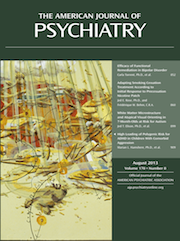An Adolescent With Nonsuicidal Self-Injury: A Case and Discussion of Neurobiological Research on Emotion Regulation
Abstract
The management of nonsuicidal self-injurious behavior is a common focus of clinical care, particularly in the treatment of adolescents and young adults. Increased recognition of this problem has led to proposed criteria for future study in DSM-5, which may be beneficial in advancing the field. Clinical care may be fruitfully informed by an understanding of the neurodevelopmental underpinnings of this behavior. The authors discuss the current status of neurobiological research related to nonsuicidal self-injury with a focus on the key dimension of emotion regulation. A case is presented to illustrate the critical points. Preliminary empirical evidence suggests disturbances in neurobiological systems relevant to emotion regulation. Disturbances involve engagement of limbic brain regions and frontal regulatory brain regions that may evolve over time. Additionally, disturbances are observed in serotonin and physiological response systems relevant to emotion regulation. Treatment with serotonin reuptake inhibitors may be most beneficial in combination with dialectical behavioral therapy to address safety, build self-soothing strategies to enhance emotion regulation, and reduce interpersonal sensitivity. Delineation of the neurobiological markers that reflect successful treatment response will help in the identification of new avenues for research and the development of personalized treatments for adolescents with nonsuicidal self-injury.



